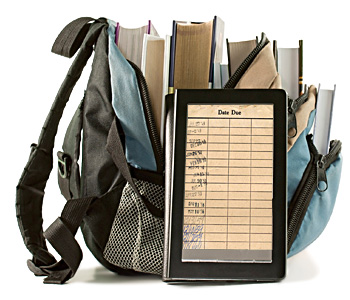It was a bit of a roller coaster for libraries and ebooks in 2012. Penguin was out—terminating its contract with OverDrive, the main supplier of ebooks to libraries, in February—and then the publisher was back in October, but only allowing library loans of its ebooks through 3M’s Cloud Library service.
In the tablet market, the push to unseat the iPad had competitors slapping an HD tag on every supersize device they produced, while Apple went small, releasing its seven-inch iPad Mini in October.
Nothing small about ebook prices for  libraries, with Random House tripling prices for that market, with $28 titles ratcheted to $84, and Hachette doubling prices on their backlisted titles. Amazon finally devised a school model—but using it as intended violates their terms
libraries, with Random House tripling prices for that market, with $28 titles ratcheted to $84, and Hachette doubling prices on their backlisted titles. Amazon finally devised a school model—but using it as intended violates their terms
of service.
So what’s in store for 2013? I see three key areas: changing ebook business models, access to more content, and affordable new hardware. The first two points are strongly linked. By exploring new business models, we could access collections of resources, which have been previously unavailable to schools. To make this work, we have to find ways to overcome the roadblocks to ebook lending experienced by public libraries.
School libraries, I believe, will be the coming focal point for ebook licensing. We have strong relationships with our K–12 publishing partners, but now we must reach out to the trade houses. As the print market weakens, the time is right for schools to present a new business proposal.
The fact is, the big trade houses aren’t very keen on “selling” ebooks to libraries. To justify its $84 ebooks, Random House implied that libraries owned the titles, but applied so many restrictions that ownership was effectively obviated by all the
fine print.
So let’s give them another option. Rather than seeking to own ebooks, school libraries should instead seek more favorable deals in a short-term lease market. Support classroom instruction with two-month book rentals, or license titles for three-year terms to avoid locking the school into endless recycling of the same novels.
If publishers are concerned about the impact on consumer sales, we can point out that these ebooks are for instructional use and not pleasure reading. By writing licenses that restrict ebook use in
classroom settings, we’re giving up some access but opening up a huge new world of content. Besides, we can always buy print books for independent reading.
Finally, 2013 should be an exciting year for hardware. By year’s end, I expect we’ll see sub-$100 tablets, not knock-off brands, but fully supported devices akin to the Kindle and Nook. We might also see color digital ink readers with better support for illustrated books. But the main hardware issue will be accessibility. Two high-profile lawsuits in 2012 established that schools and libraries purchasing ebook readers must buy accessible devices. Currently, none of the E-Ink based devices (Kindle Paperwhite or Nook Simple Touch, for example) are accessible, according to ADA definitions. Make sure your district considers accessibility if it’s planning to buy mobile computing and reading devices this year.
Christopher Harris (infomancy@gmail.com) is coordinator of the school library system of the Genesee Valley (NY) Educational Partnership.



“If publishers are concerned about the impact on consumer sales, we can point out that these ebooks are for instructional use and not pleasure reading.” The assumption that these are two nonoverlapping parts of a Venn diagram is more than a little disturbing to me as a public high school librarian, where getting students to read for fun is a huge part of our mission.
“Besides, we can always buy print books for independent reading.” Why is independent reading a “besides” and not a large part of the ebook problem/solution?
I agree with Amy. This does seem like strange perspective. Independent reading is just that, whether it’s instructional or “for pleasure.” I must admit however that I can’t imagine most text books “pleasure reading.”
I have idea for school . i want build device that book school for format file .pdf keep into device
and student use from device for example button for teach Mathematics .button for chemistry.when
student push button.see teach Mathematics.